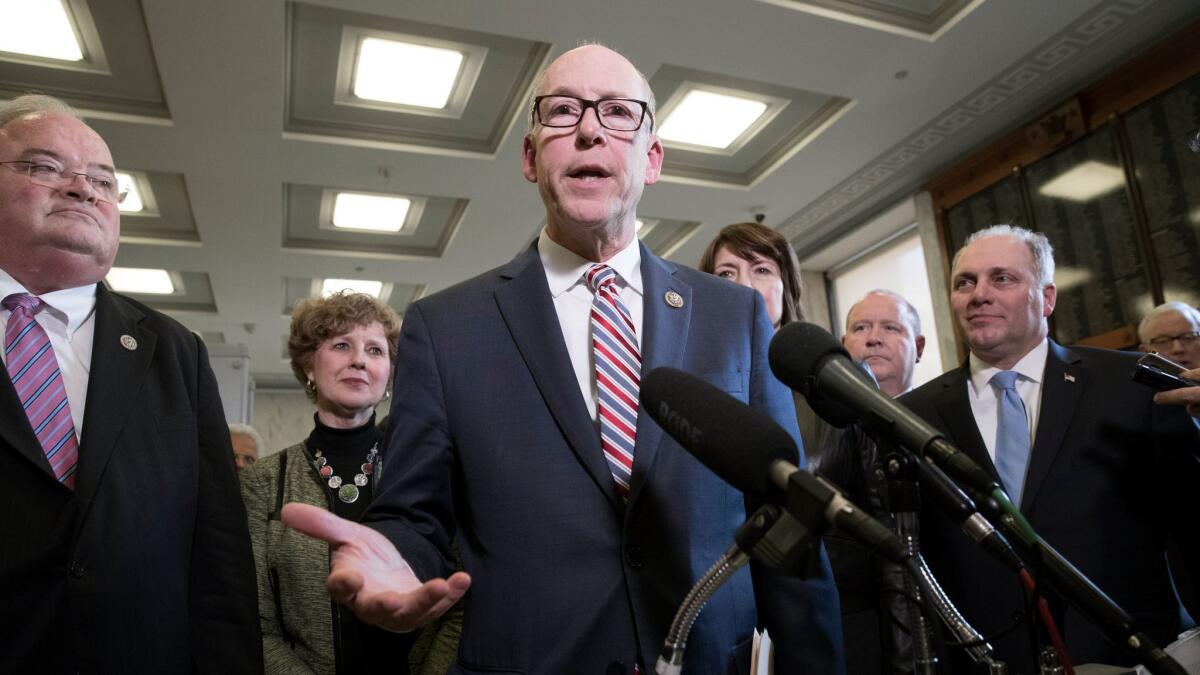Editorial: The GOP makes no bones about one part of its healthcare plan: Kicking millions of poor people off Medicaid

- Share via
In discussing the House GOP leadership’s proposed replacement for Obamacare, its supporters have stuck to platitudes that obscure much of what the bill would actually do. For example, sponsors tout a “patient-centered healthcare system” instead of explaining that the bill would encourage insurers to isolate people with pre-existing conditions in expensive policies while selling affordable ones to younger and healthier people.
But there’s one thing they’re making no bones about: They want to kick millions of people off of Medicaid, the joint federal-state healthcare program for the poor. It wouldn’t happen immediately, but it would happen inexorably, deliberately.
The leadership’s proposal, which was unveiled Monday and rushed through two House committees Thursday, would raise costs and threaten insurance coverage for millions of more well-off Americans as well. That’s one reason it has drawn intense fire from doctors, hospitals, healthcare economists and analysts. But the Medicaid provisions may be the most alarming, given whom they would victimize.
Medicaid cuts are needed to help pay for the tax cuts in the House package, some $310 billion of which would flow over 10 years to high-income Americans.
Granted, there are too many Americans on Medicaid (known as Medi-Cal in California) — almost 69 million, not counting the 5.5 million people in the related Children’s Health Insurance Program — and it should be our goal as a society to reduce the ranks of people who require government subsidies to pay for their basic healthcare. But the right way to do so is by helping more people climb out of poverty, not by making it harder for states to insure them.
Similarly, too many Medicaid programs reward doctors and hospitals based on the number of patients they treat rather than the effectiveness of the care they provide, creating perverse incentives that raise costs. That’s why Los Angeles County, among other places, are trying to lower costs over the long term by addressing the root causes of poor health and changing the way care is delivered.
That would not be the House Republicans’ approach. Their first goal is to phase out coverage for the 14.4 million people — families and childless adults who earn no more than 138% of the federal poverty level, or $16,400 per year for a single individual — added to Medicaid in 31 states and the District of Columbia by Obamacare (formally known as the Patient Protection and Affordable Care Act). They would do so by slashing the federal government’s contribution to the cost of insuring anyone in that category added to Medicaid after 2019, even if they’d been covered previously. States could continue to add people in this category, but the reduced federal aid would leave few if any able to do so; in California, the extra cost is projected to be $8 billion a year.
The second goal of the GOP proposal is to pare funding for those who’ve been eligible for Medicaid since its inception — impoverished families, disabled people, low-income pregnant women and children — by not allowing federal aid to keep up with the increase in healthcare costs. That squeeze is expected to begin in 2020, the very first year the proposed changes go into effect, and to worsen over time.
Supporters of the GOP proposal say they’re trying to rein in a program that is consuming an ever-larger percentage of federal and state budgets. According to federal analysts, Medicaid spending consumed about 15% of state tax dollars and 9.5% of federal outlays.
That’s not the only motive, however. Republicans argue that Medicaid should be a temporary safety net for vulnerable Americans, not a long-term crutch for the sort of able-bodied people covered by the Medicaid expansion. In other words, if you’re capable of working but not making enough to afford health insurance, that’s just your fault. (Yes, the House GOP package includes new tax credits to subsidize insurance for those of relatively modest means. But those subsidies are far smaller for poor people than the ones in Obamacare, putting coverage out of reach for those insured through the Medicaid expansion.)
There’s also the inconvenient fact that the Medicaid cuts are needed to help pay for the tax cuts in the House package, some $310 billion of which would flow over 10 years to high-income Americans. Republicans complained in 2010 when the Affordable Care Act cut spending in Medicare to help finance insurance coverage for lower-income Americans, but that’s nothing compared to cutting Medicaid to give a tax break to the wealthy.
Making Medicaid less costly and more effective is just one part of the larger challenge of reining in all healthcare costs. And that job can’t be done if millions of people go uninsured, with no oversight of their health or management of their care. In other words, it takes time and a long-term focus, neither of which are on display in the House’s headlong rush toward a healthcare disaster.
Follow the Opinion section on Twitter @latimesopinionand Facebook
More to Read
A cure for the common opinion
Get thought-provoking perspectives with our weekly newsletter.
You may occasionally receive promotional content from the Los Angeles Times.








